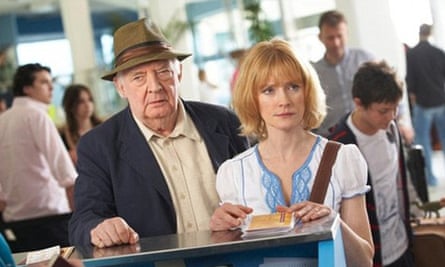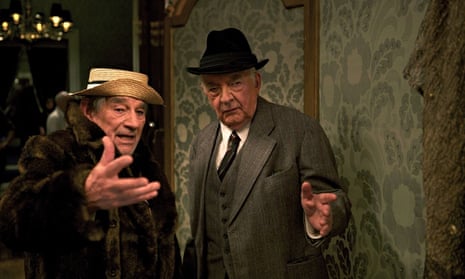David Ryall, who has died aged 79, was one of the most distinguished character actors at the National Theatre over many years, playing important roles for successive artistic directors, Laurence Olivier and Peter Hall, in the 1970s and 80s, and appearing in the premieres of plays by Tom Stoppard, Michael Frayn, Peter Shaffer, Adrian Mitchell, Peter Nichols and Simon Gray.
And as do many character actors today, he wore the Harry Potter label, appearing in the seventh of the eight films, Harry Potter and the Deathly Hallows, Part One (2010), as Dumbledore’s friend Elphias Doge, who greets Harry at the wedding of Bill Weasley and Fleur Delacour before he “disapparates” in the mayhem caused by the Death Eaters. But even in this cameo, you can see the twinkling charm of the actor, and gauge the lightness and musicality of his voice, which emanated from a benign, rubbery visage that could all the same cloud and harden with darker emotions.
He was familiar in patrician, or grandfatherly, roles in the most adventurous series on television in the last few decades: suffering from dementia as Claire Skinner’s father, Frank, in the semi-improvised family comedy series Outnumbered; as patriotic Eric in Goodnight Sweetheart starring a time-travelling Nicholas Lyndhurst; or as old Bert, who recounts his life in a series of flashbacks, in The Village, starring John Simm and Maxine Peake.
He last appeared at the National in 2011, when he played a wry, decrepit Feste in Peter Hall’s 80th birthday present production of Twelfth Night, with Hall’s daughter, Rebecca, as Viola. The theory was that this Feste might have been a defrocked priest in a former life; he certainly came with a lot of buried baggage, and made it tell.

And having once played Gloucester, beautifully, to the King Lear of Oliver Ford Davies at the Almeida theatre in 2002, he signed off as Lear himself in a low-key fringe production at the Cockpit theatre, London, in March 2014. This was a remarkable performance. Recovering from a course of chemotherapy, Ryall played the monarch with a script in hand, and with his daughters in the cast, as his carers, almost: Imogen was the doctor, and Charlie, the younger sibling, was a touching Cordelia.
As Lear, he entered in a wheelchair. At the end, he put Cordelia in the same chair and died with his head in her lap, letting the script, at last, fall to the floor, all passion spent. At the time of this performance, he described in the Guardian the effect Olivier had had on him in their years of working together: “When he left the room, it was as if all the furniture went with him. Nothing was left behind.”
The only child of John, a clerical worker with P&O, and Gladys, he was born in Shoreham-by-Sea, West Sussex, and went to Shoreham grammar school. David joined the merchant navy for a brief while but his father, noting his enthusiasm for amateur dramatics, encouraged him to try for drama school. He won a scholarship to Rada in 1962, appeared in repertory theatre in Salisbury, joined the National in 1965 on a year’s contract and stayed for eight. He appeared in Stoppard’s Jumpers and Shaffer’s The Royal Hunt of the Sun, Nichols’s The National Health and Carl Zuckmayer’s The Captain of Köpenick, in which Paul Scofield gave one of his greatest performances.
In 1973, he joined Peter O’Toole for a season at the Bristol Old Vic, appearing in Shaw’s The Apple Cart and Ben Travers’s Plunder, while becoming increasingly busy on television in such series as The Pallisers in 1974 (he played Sexton Parker) and, later on, Lovejoy, Casualty, The Bill, Doctors, The Singing Detective, Prime Suspect, Inspector Morse and Holby City.
Back at the National, and now on the South Bank, he featured in Richard Eyre’s glorious revival of Guys and Dolls in 1982, as well as Eyre’s production, in the same year, of The Beggar’s Opera with Imelda Staunton and Paul Jones, followed by a string of performances for Hall: as Sicinius Velutus in Ian McKellen’s magnificent Coriolanus in 1984, and in a masked, semi-anthropomorphic Animal Farm. He won the Clarence Derwent award for a supporting actor in 1985.
He played Winston Churchill three times in separate television projects, a jowly, rhetorical flourish easily encompassed. Everything he did, in fact, looked easy and unforced, and at the same time naturally funny.
When he switched horses from the National to the Royal Shakespeare Company, briefly, at the end of the 90s, he was an ideal Polonius in a strangely underrated Hamlet with Alex Jennings. He then embroiled himself in John Barton’s long simmering, never satisfactory Tantalus epic, directed by Hall, before returning to the National to play Herbert Wehner in Frayn’s Democracy ( in 2003, with Roger Allam as Willy Brandt), directed by Michael Blakemore.
Film roles included the Man with Whores in David Lynch’s The Elephant Man (1980), with Anthony Hopkins and John Hurt, George in Anthony Minghella’s Truly Madly Deeply (1990), the Mayor in Christopher Hampton’s Carrington (1995) and Lord Salisbury in Frank Coraci’s Around the World in Eighty Days (2004). His last film was Dustin Hoffman’s Quartet (2012), scripted by Ronald Harwood, in which he played a lovely Flanagan and Allen duet of Underneath the Arches with Trevor Peacock in a retirement home for old musicians.
He is survived by his third wife, Penny (nee England); by a son, Jonathan, a music manager, and daughter, Imogen, a jazz singer, from his first marriage, to Gillian Eddison, which ended in divorce; and by a daughter, Charlie, an actor, from his second marriage, to Cathy Buchwald, which ended in divorce.

Comments (…)
Sign in or create your Guardian account to join the discussion